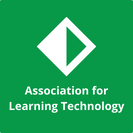All News
20 November 2025
This is your last chance to register for ALT’s upcoming Digital Accessibility Workshop, taking place online on Tuesday, 25 November 2025, from 2:00 PM – 5:00 PM.
This interactive session is designed...
23 October 2025
At this year’s ALT Annual Conference, we proudly announced the winners of the 2025 ALT Awards, recognising excellence in research, practice, and leadership in Learning Technology. Since 2007, the ALT...
23 October 2025
Announced at the ALT Annual Conference 2025, ALTC25 Revisited is a dynamic online event taking place on 25 February 2026, designed to extend the conversation and open it up to even more voices.
We’ll...
20 October 2025
This year, AmplifyFE celebrates a remarkable five-year journey of connecting and uplifting professionals across FE, Skills and vocational education. Since its launch in October 2020, the AmplifyFE...
17 October 2025
With the ALT Annual Conference just days away, we’re excited to spotlight the incredible sponsors and exhibitors who are helping shape this year’s conference experience. The ALTC25 exhibition space...
14 October 2025
The wait is nearly over. The ALT Annual Conference 2025 is just around the corner, and excitement is building fast. With only 9 days to go until the conference (Thursday, 23 and Friday, 24 October),...
10 October 2025
ALT is pleased to announce an exciting opportunity for professionals in Further and Higher Education to deepen their understanding of digital accessibility. Join us online on Tuesday, 25 November...
08 October 2025
We’re delighted to announce the launch of the Online Programmes Special Interest Group (SIG).
This SIG offers a collaborative space for ALT members involved in the design, delivery, and management...
02 October 2025
As we get ready to welcome you to ALTC25, we’d like to take a moment to thank the generous sponsors who are helping make this year’s conference possible.
Each of our sponsors is bringing their own...
01 October 2025
As this is a busy time of year for many colleagues, we are extending the deadline to submit Expressions of Interest for the roles of Vice-Chair or Trustee on ALT’s Board to Monday 3 November 2025 at...
